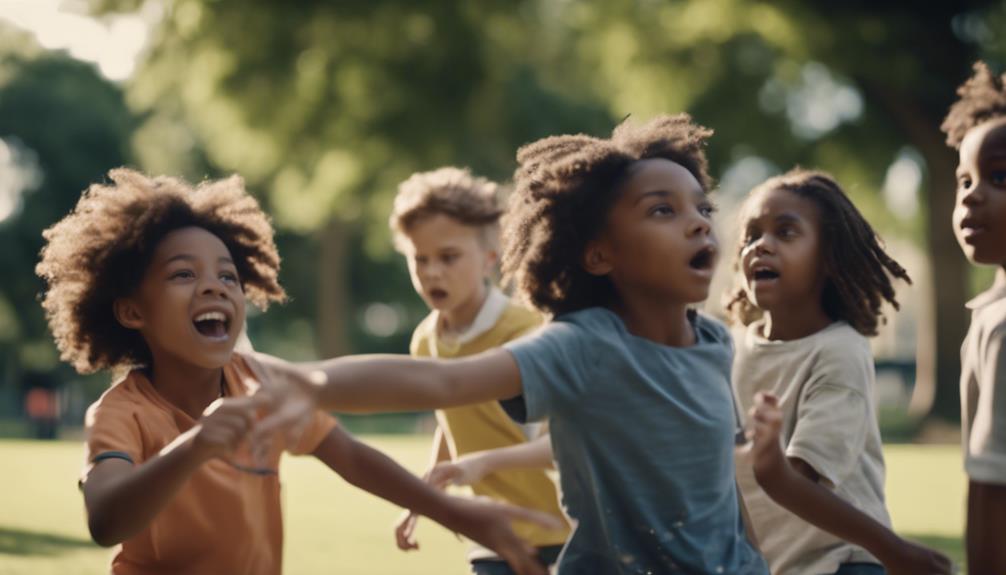To ensure your child’s future success, focus on developing essential learning skills. Communication skills are important for effectively expressing thoughts and forming connections. Problem-solving techniques help foster creativity and critical thinking. Critical thinking skills promote logical reasoning and sound decision-making. Learning from mistakes can help cultivate resilience and a growth mindset. Decision-making skills empower children to make informed choices that align with their beliefs. Teaching practical life skills such as money management and time management instills important habits for success. Encouraging independence helps build resilience, adaptability, and confidence. These skills are essential for nurturing a well-rounded individual. Encourage your child to explore these important skills to establish a strong foundation for future achievements.
Key Takeaways
- Communication skills aid in understanding and connecting with others.
- Problem-solving techniques encourage creative and critical thinking.
- Critical thinking skills develop analytical reasoning and decision-making.
- Learning from mistakes fosters resilience and growth mindset.
- Practical life skills like money and time management promote independence and responsibility.
Essential Communication Skills
To effectively navigate social interactions and build strong relationships, kids need to develop essential communication skills. Communication skills are vital for children as they're important in helping them understand, interact, and connect with others effectively. By honing these skills, children can express themselves clearly, share their thoughts, and engage in meaningful conversations that foster better relationships and mutual understanding.
Practicing communication skills at home, such as actively listening and responding to family members, can greatly aid children in developing these important capabilities. When children can articulate their ideas and feelings clearly, it not only enhances their social interactions but also boosts their confidence and self-esteem.
Understanding the significance of communication skills early on equips children with a valuable tool that will benefit them in various social settings and academic pursuits. By mastering these foundational skills, children can navigate different social situations with ease and build strong connections with others throughout their lives.
Problem-Solving Techniques

When it comes to problem-solving techniques for kids, it's important to encourage creative thinking and critical analysis.
By engaging in practical problem-solving activities, children can develop their skills in finding innovative solutions.
Implementing strategies that promote critical thinking exercises can enhance their ability to tackle challenges effectively.
Creative Problem-Solving Strategies
Creative problem-solving strategies entail thinking innovatively to discover unique solutions to challenges. To effectively tackle problems, consider the following essential techniques:
- Thinking Outside the Box:
Engage in unconventional thinking to explore new perspectives and approaches that may not be immediately apparent.
- Encouraging Brainstorming:
Foster a collaborative environment where diverse ideas can be freely shared and built upon to generate creative solutions.
- Visualization Techniques:
Use visual aids such as diagrams, charts, or mind maps to better understand the problem at hand and identify potential pathways to a solution.
- Trial and Error Methods:
Experiment with different solutions, learn from failures, and refine strategies based on the outcomes to iteratively reach a successful resolution.
Critical Thinking Exercises
Engaging in critical thinking exercises enhances children's problem-solving skills and fosters analytical reasoning. These exercises are designed to help kids develop strategic thinking, logical reasoning, and creative problem-solving skills.
By encouraging children to contemplate multiple perspectives and think innovatively, critical thinking exercises push them to analyze information effectively. Observing, analyzing, and using innovative strategies to tackle challenges are key components of these exercises.
Through engaging in critical thinking tasks, children not only learn to make sound decisions but also understand the consequences of their choices. They're encouraged to formulate hypotheses for effective problem-solving.
Practical Problem-Solving Activities
Practicing practical problem-solving activities with children involves guiding them through identifying, brainstorming, and implementing solutions in real-life scenarios. Engaging kids in such activities helps them develop essential life skills that are vital for their overall growth and development.
Here are some key points to keep in mind when teaching kids practical problem-solving:
- Encourage critical thinking: Encouraging children to think critically in real-life situations enhances their problem-solving abilities.
- Hands-on activities: Engage children in hands-on activities like building puzzles, creating DIY projects, and playing strategy games to help them develop problem-solving techniques.
- Break down complex problems: Teach kids to break down complex issues into smaller, manageable parts to foster effective problem-solving skills.
- Learn from mistakes: Instill in children the importance of using problem-solving techniques such as trial and error, asking for help when needed, and learning from mistakes to find solutions effectively.
Building Critical Thinking Skills

To foster critical thinking skills in kids, start by encouraging them to analyze information, problem-solve, and make sound decisions. Essential for understanding consequences, formulating hypotheses, and seeking solutions. Developing these skills helps children think rationally and make informed choices.
By nurturing critical thinking abilities, children can enhance their strategic thinking and engage in creative problem-solving. Encourage kids to question assumptions, evaluate evidence, and consider alternative perspectives. Provide them with opportunities to practice decision-making in various situations, allowing them to weigh options and anticipate outcomes.
Engage children in activities that stimulate their logical reasoning and challenge them to think critically. By fostering these skills early on, you're equipping children with the tools they need to navigate complex problems and make well-thought-out decisions in the future.
Learning From Mistakes

Learning from mistakes builds resilience and strength in children, preparing them to face challenges with confidence. When kids embrace errors as opportunities for growth, they develop a positive mindset towards setbacks.
Here are four key points emphasizing the importance of learning from mistakes:
- Opportunities for Growth: Encouraging children to view mistakes as stepping stones towards improvement fosters a growth mindset that values the learning process over perfection.
- Not Signs of Failure: Mistakes shouldn't be seen as failures but as valuable lessons that contribute to success in various areas of life.
- Focus on Effort: Shifting the focus from achievement to effort after making mistakes promotes a healthy approach to learning, emphasizing the importance of perseverance and determination.
- Fostering Resilience: Teaching children to learn from their mistakes not only cultivates a growth mindset but also equips them with the resilience needed to navigate obstacles effectively.
Developing Resilience

Resilience, essential for managing life's challenges, is the ability to bounce back from setbacks and adversities. Teaching kids about resilience is vital as it equips them with the tools to cope with stress and adversity effectively.
By building resilience in children, parents and educators can help them develop problem-solving skills and cultivate a mindset of positive thinking. Resilient kids tend to perform better both academically and emotionally as they learn to navigate difficulties with a sense of determination and optimism.
Encouraging children to face challenges head-on and teaching them how to adapt to setbacks fosters mental toughness and adaptability. By instilling resilience at a young age, kids can develop a strong foundation for overcoming obstacles in various aspects of life.
The process of building resilience involves guiding children to approach problems with a solution-oriented mindset and encouraging them to maintain a positive outlook even in the face of adversity.
Making Effective Decisions

When it comes to making effective decisions, it's important to carefully weigh your options before taking action. By considering the long-term effects of your choices, you can make decisions that align with your goals and values.
Teaching kids these decision-making skills early on sets the foundation for independence and confidence in facing life's challenges.
Decision-Making Process
To make effective decisions, children need to evaluate options, consider consequences, and choose the best course of action. Teaching kids decision-making skills is essential in their development as it helps build confidence, independence, critical thinking skills, and problem-solving abilities. Here are some key ways to guide children through the decision-making process:
- Encourage Critical Thinking: Encouraging children to think critically about various options enables them to make informed decisions.
- Promote Independence: Allowing children to make decisions autonomously fosters independence and self-reliance.
- Foster Problem-Solving Abilities: Teaching kids how to navigate obstacles when making decisions enhances their problem-solving skills.
- Build Confidence: Providing opportunities for children to practice decision-making in safe environments boosts their self-assurance and belief in their abilities.
Weighing Options Carefully
Careful consideration of the available choices is essential in making effective decisions for kids. When helping children weigh their options, it is vital to encourage them to think critically, prioritize their values, and consider the potential consequences of their decisions. By engaging in this process, kids develop essential decision-making skills that will serve them well throughout their lives.
To visually represent the importance of weighing options, consider the following table:
| Pros | Cons | Prioritize Values | Consider Consequences |
|---|---|---|---|
| – Helps make informed choices | – Can be time-consuming | – Aligns decisions with beliefs | – Enables better long-term planning |
| – Encourages critical thinking | – May require additional research | – Fosters personal growth | – Enhances problem-solving skills |
| – Empowers children to take ownership | – Can be overwhelming | – Builds decision-making confidence | – Develops a sense of responsibility |
Considering Long-Term Effects
Considering the long-term effects of decisions is vital for children to make effective choices that impact their future positively. Teaching kids how to weigh options and foresee consequences can greatly build life skills for kids. Here are four reasons why understanding the long-term effects of decisions is essential for children:
- Building Resilience: By learning to take into account long-term consequences, children can develop resilience to handle challenges and setbacks more effectively.
- Fostering Adaptability: Understanding the lasting impact of decisions helps kids adapt to changing circumstances and make necessary adjustments in their choices.
- Promoting Independence: Taking into consideration long-term effects empowers children to make decisions independently, leading to a sense of autonomy and self-reliance.
- Enhancing Confidence: Making informed choices about the future instills confidence in kids, enabling them to navigate the complexities of the world with assurance.
Helping children learn to make informed decisions early on can shape their perception of the world and equip them with essential life skills for a successful future.
Practical Money Management

Teaching your kids practical money management skills involves instilling the importance of budgeting, saving, and making wise spending choices early on. Kids need to learn about financial literacy to make informed decisions about money, which sets the stage for a secure financial future.
By teaching practical money management, parents can help their children build savings habits that will benefit them throughout their lives. Tools like GoHenry offer a hands-on approach to educate kids about money, enabling them to manage their finances independently. Additionally, understanding the advantages of prepaid debit cards can teach children about responsible spending and foster financial independence.
Through activities such as managing allowances and developing saving routines, children can gain financial confidence and establish a strong foundation for their financial well-being. By focusing on practical money management skills, parents can equip their kids with the tools they need to navigate the complexities of personal finance successfully.
Encouraging Independence

Promoting independence in children is essential for building self-reliance habits and fostering decision-making skills. By providing opportunities for them to make choices and take on responsibilities, you're helping them develop the confidence to tackle tasks on their own.
This approach not only promotes problem-solving abilities but also instills a sense of ownership and accomplishment in children as they navigate their path toward becoming independent individuals.
Building Self-Reliance Habits
Developing self-reliance habits in kids involves fostering their independence through age-appropriate responsibilities and decision-making opportunities.
Here are some key points to keep in mind when encouraging self-reliance in children:
- Teach Life Skills: Providing children with the knowledge and abilities to handle daily tasks independently is essential. From basic chores to personal organization, teaching these life skills early on sets a foundation for self-reliance.
- Help Build Important Traits: Encouraging independence helps build essential traits like resilience, adaptability, and resourcefulness in children. These traits are valuable for coping with challenges and uncertainties in life.
- Children Need Kids to Learn: Allowing children to learn from their experiences, both successes, and failures, is crucial. It fosters a sense of accountability and self-awareness, contributing to their overall growth and development.
- Promote Problem-Solving Skills: Building self-reliance habits early prepares children for adulthood by enhancing their problem-solving abilities. Encouraging them to find solutions independently instills confidence and a sense of accomplishment as they overcome obstacles.
Fostering Decision-Making Skills
To nurture children's ability to make decisions independently, focus on guiding them towards developing their decision-making skills through empowering choices and experiences. Kids need to learn how to analyze situations, weigh options, and take decisive actions. By providing them with opportunities to make choices, you help them build important life skills that will serve them well in the future.
Making connections between decision-making and its outcomes is essential in helping your child understand the impact of their choices. Encouraging independence in decision-making not only fosters confidence and self-reliance but also teaches essential elements such as accountability and responsibility. As a parent, you play an important role in supporting your child's decision-making process, guiding them through challenges and uncertainties.
Nurturing Empathy

Nurturing empathy in kids involves fostering their ability to understand and share the feelings of others. Here are some key ways to help children learn empathy and develop a deeper understanding of the world around them:
- Encourage perspective-taking: Teach kids to see things from different viewpoints, promoting empathy by understanding diverse experiences.
- Model empathy: Show empathy in your interactions with others as children learn by example.
- Practice active listening: Encourage kids to listen attentively and validate others' feelings, fostering empathy through communication.
- Promote acts of kindness: Engage in activities that teach kids the impact of their actions on others, helping build stronger relationships based on empathy and compassion.
Time Management Strategies

To help your child effectively manage their time and tasks, consider implementing strategies that promote organization and productivity. Teaching kids time management skills is vital as it helps them prioritize tasks efficiently and avoid procrastination.
Using visual aids like calendars and timers can assist children in managing their time effectively. Encouraging kids to break tasks into smaller chunks can make time management less overwhelming.
It's important to teach children the significance of setting realistic goals and deadlines to instill the value of planning and organizing their time effectively.
Frequently Asked Questions
What Are the 7 Essential Life Skills?
To thrive in life, you need essential skills like focus, communication, problem-solving, and more. These abilities empower you to navigate challenges and succeed. Building a strong foundation early on sets you up for future growth.
What Skills Should an 8 Year Old Have?
You should have basic decision-making abilities like choosing outfits or snacks. Understanding the value of coins and good personal hygiene habits are vital. Learning time management through chores and improving communication skills are also important at your age.
How to Teach Kids Basic Life Skills?
Show kids basic life skills by modeling tasks, involving them in daily activities, and offering guidance. Teach first aid, hygiene, responsibility, decision-making, coping with failure, independence, driving, job applications, manners, money management, ordering, and cultural awareness for holistic development.
What Should a 10 Year Old Know Academically?
By the age of 10, you should have a solid grasp of reading comprehension, math concepts like multiplication and fractions, knowledge of scientific principles, understanding of geography and history, and proficiency in writing skills.
Conclusion
To sum up, teaching children essential learning skills is vital for their development and success in the future. By focusing on communication, problem-solving, critical thinking, resilience, money management, independence, empathy, and time management, parents and educators can help children navigate the challenges they'll face in life.
Remember, as the saying goes, 'knowledge is power,' and by equipping children with these skills, we're empowering them to thrive in a constantly changing world.










